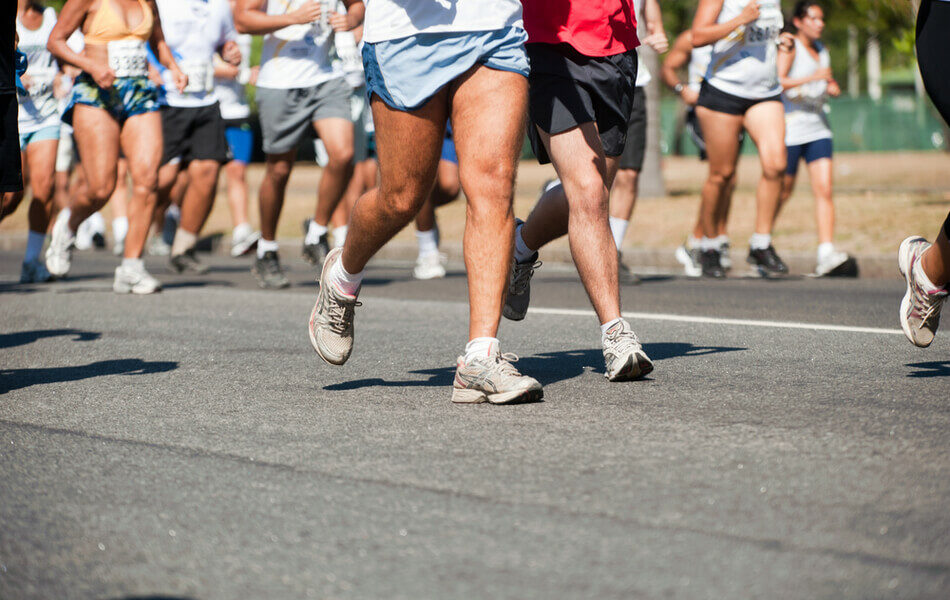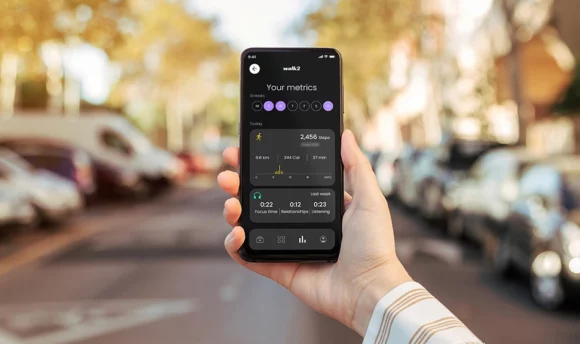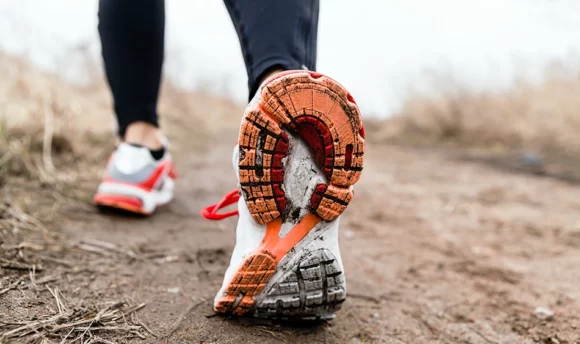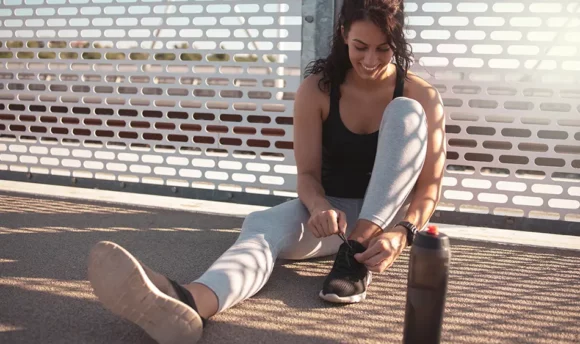What Is the Average 10K Time? 3 Tips That Will Help You Improve Your Running Pace
Thinking about running a 10K? This article will provide you with all the information you need to get ready for your big race.

People choose to run 10Ks for a number of reasons. Finishing a 10K could be a personal goal of yours or a challenge from your friends.
If the latter is the case and you hate running, check out our article all about how to start running, even when you hate it.
Regardless of your reasons for wanting to try this race, it’s important to prepare beforehand. This will give you the best chance of not only finishing the race but possibly even enjoying it.
In this article, you will learn everything you need to know about the race itself, as well as how best to prepare for it.
What Is an Average 10K Time?
The average runner can expect to finish a 10K race in 50–70 minutes. More advanced runners will usually finish between 40–50 minutes, and elite athletes will cross the finish line in as little as 36 minutes.
The average time for men to run a mile in a 10K race is around 9 minutes, and for women, their mile time is closer to 10.
How Many Miles Is a 10K?
A 10K run is 6.2 miles. It is the second most popular run after the half-marathon, despite being only half the distance.
What Is a “Good” 10K Time and Pace?
Finishing a race of this size in and of itself is a great accomplishment. Anyone who is able to finish this race in under an hour is in the top percentile. Novice runners will generally take up to 1 hour and 15 minutes to finish.
If you are able to stick with an average of 10 minutes or less per mile while you run a 10K, you will be setting an above-average pace.
What Makes an Impact on Running Time?
There are several factors that will have an impact on a person’s running time, the most important of which we will review here.
Age
As you age, you can expect your body to slow down, and with it, your mile time.
The optimal age range for runners, both male and female, is 20–35. This is the period in which your muscles have grown enough to sustain a higher output but have not begun to atrophy.
An increase in muscle size is what improves a person’s running ability as compared to someone younger than 20.
After the age of 30, you can expect a 0.5–1% decline in performance per year. As you age, your muscles begin to decrease in size. This includes your muscle fibers, which are responsible for carrying out controlled physical movements in the body.
Sex
When it comes to physical activity, men have an advantage.
The difference between the 10-km time of men and women world record holders is a whopping 3 minutes.
The simple explanation is that male bodies work differently. Their bodies and hormonal balance are made to endure long, strenuous efforts.
Men’s legs consist of 80% muscle – that’s 20% more than women, whose bodies naturally have a higher percentage of fat.
However, all these reasons should not discourage female readers. With the right training, they too can achieve great personal bests.
Ability
How quickly you will be able to finish a 10K will depend on your running ability.
Running ability can be affected by things like how often you train, how intensely you train, and for how long you have been training.
A beginner can be described as anyone who has been training for less than 6 months. Because of their lack of experience running, they can expect to finish in the 5th percentile, meaning that they will finish the race faster than only 5% of the other runners.
An elite athlete often has at least 5 years of running experience under their belt. Their dedication to their training will allow them to finish faster than 85% of the other 10K runners.
How to Improve a 10K Running Pace?
As your running ability improves, so will your 10K running pace. In this section, we will take a deeper dive into the different practices that can develop your running ability.
Practice different types of runs
Although 10K races are made to test your endurance, there are benefits to training using more than one method.
Running long distances will help you build your slow-twitch muscles and improve your cardiovascular health, but doing the same training routine can lose its excitement after time.
Instead, try working some of the following activities into your training days:
Fartlek
A fartlek run is where you mix different speeds into your run, challenging your endurance. An example of a fartlek workout would be to choose a spot in the distance to sprint, followed by a light jog to recover. Rinse and repeat.
Hill repeats
Hill repeats are hard segments of uphill running, followed by a cool-down as you descend. The incline of whatever you choose to do should not be exceedingly steep. These runs should be challenging but leave you with enough energy to do 5–10 sets.
This kind of training not only builds your muscle size and physical stamina but challenges your mind, as completing hill runs is no easy task.
Tempo run
A tempo run involves figuring out the top speed you’re able to maintain for a long time. Once you know, find your tempo, and continue running at it for as long as possible.
Beginners will sustain this speed for at least 20 minutes, and more experienced runners – for up to an hour.
Recovery run
A recovery run can be done on days when you are feeling sore or when energy levels are low.
The point of these runs is to move lactic acid buildup in the body and increase your weekly mileage by running on “rest” days.
Try a balanced diet
Although it might seem like diet and exercise are unrelated, improving your eating habits will get you one step closer to reaching your fitness goals and successfully completing a 10K.
If being consistent is something you struggle with, you might want to bring in some reinforcements. There are many apps that help you by creating workout routines for you to follow, and apps like Joggo also include meal plan options for their users to follow.
Diet is often a sticking point for people and a big reason why they don’t end up meeting their fitness goals.
You might struggle with binge-eating or simply be in need of some healthy recipes to help you stay inspired about your new diet. Either way, apps like Joggo can provide you with all the information and motivation you need.

- Personalized running plans created by professional coaches
- Meal plans perfectly tailored to your current diet, allergies, and health needs
- Treadmill mode for people preferring indoor running
- Educational articles on easier running, injury prevention, nutrition, and more
- Behavior science-based reward system for lasting motivation
Weight lifting
Running is a high-impact exercise, meaning that it puts a high level of impact on your joints.
Although lifting weights to improve your “runner’s body” might seem counter-intuitive, weight-lifting can help strengthen your muscles and joints.
Increased strength of your muscles and joints can help decrease your risk of injury as you train. Not only that but switching up your workout routine to include weight training can help you stay motivated over time.
FAQs
The average time to run a 10K for women of all ages is 54 minutes. This averages out to 8.7 minutes per mile.
The average time to complete a 10K for men of all ages is 47 minutes. This averages out to 7.5 minutes per mile.
Beginners can expect to finish a 10K somewhere between 60 and 75 minutes.
A Word From Our Coach
There are many reasons why someone might want to run a 10K.
Regardless of their why, preparing for and running a 10K can help put someone’s fitness journey on an upward trajectory.
Taking on a physical challenge like running a 10K can be just the push you need to start focusing on healthier lifestyle choices.
It’s often easier to maintain a consistent training schedule and follow a diet when we have a clear goal that we are working toward.
Once you start treating your body with more care, you might find that going back to your old habits isn’t something that appeals to you anymore.
Bottom Line
In this article, we covered the numbers you should be reaching for in your training sessions, depending on your age and skill level, as well as some of the best ways for you to prepare for your big race.
Taking on a race of this size is no easy feat. Focusing on improving your overall health and building healthier habits will provide you with benefits that outlast your race.
Then, no matter how many minutes it takes you to complete your 10K run, you can feel good knowing that you accomplished something big.
Male 10K Running Finishing Times
| Age | Beginner | Novice | Intermediate | Advanced | Elite | WR |
| 10 | 01:18:09 | 01:05:13 | 55:45 | 48:48 | 43:43 | 31:30 |
| 15 | 01:07:39 | 56:28 | 48:15 | 42:15 | 37:51 | 27:16 |
| 20 | 01:05:30 | 54:39 | 46:43 | 40:54 | 36:38 | 26:24 |
| 25 | 01:05:30 | 54:39 | 46:43 | 40:54 | 36:38 | 26:24 |
| 30 | 01:05:30 | 54:39 | 46:43 | 40:54 | 36:38 | 26:24 |
| 35 | 01:06:06 | 55:09 | 47:09 | 41:16 | 36:58 | 26:39 |
| 40 | 01:07:58 | 56:43 | 48:29 | 42:26 | 38:01 | 27:24 |
| 45 | 01:10:43 | 59:01 | 50:26 | 44:10 | 39:33 | 28:30 |
| 50 | 01:13:42 | 01:01:30 | 52:34 | 46:01 | 41:14 | 29:43 |
| 55 | 01:16:57 | 01:04:13 | 54:53 | 48:03 | 43:03 | 31:01 |
| 60 | 01:20:30 | 01:07:11 | 57:25 | 50:16 | 45:02 | 32:27 |
| 65 | 01:24:23 | 01:10:25 | 01:00:11 | 52:42 | 47:12 | 34:01 |
| 70 | 01:28:40 | 01:14:00 | 01:03:15 | 55:22 | 49:36 | 35:45 |
| 75 | 01:34:32 | 01:18:53 | 01:07:26 | 59:02 | 52:53 | 38:06 |
| 80 | 01:43:56 | 01:26:45 | 01:14:08 | 01:04:54 | 58:08 | 41:54 |
| 85 | 01:58:54 | 01:39:14 | 01:24:49 | 01:14:15 | 01:06:31 | 47:56 |
| 90 | 02:24:04 | 02:00:14 | 01:42:45 | 01:29:58 | 01:20:35 | 58:04 |
Female 10K Running Finishing Times
| Age | Beginner | Novice | Intermediate | Advanced | Elite | WR |
| 10 | 01:28:35 | 01:15:13 | 01:05:03 | 57:26 | 51:44 | 35:40 |
| 15 | 01:18:52 | 01:06:58 | 57:55 | 51:07 | 46:03 | 31:45 |
| 20 | 01:13:58 | 01:02:48 | 54:19 | 47:57 | 43:12 | 29:47 |
| 25 | 01:13:49 | 01:02:40 | 54:13 | 47:51 | 43:06 | 29:43 |
| 30 | 01:13:58 | 01:02:48 | 54:19 | 47:57 | 43:12 | 29:47 |
| 35 | 01:14:53 | 01:03:35 | 55:00 | 48:33 | 43:44 | 30:09 |
| 40 | 01:16:43 | 01:05:08 | 56:20 | 49:44 | 44:48 | 30:53 |
| 45 | 01:19:34 | 01:07:33 | 58:26 | 51:35 | 46:28 | 32:02 |
| 50 | 01:23:41 | 01:11:03 | 01:01:27 | 54:15 | 48:52 | 33:41 |
| 55 | 01:28:40 | 01:15:17 | 01:05:07 | 57:29 | 51:47 | 35:42 |
| 60 | 01:34:18 | 01:20:04 | 01:09:15 | 01:01:08 | 55:04 | 37:58 |
| 65 | 01:40:42 | 01:25:30 | 01:13:57 | 01:05:16 | 58:48 | 40:32 |
| 70 | 01:48:01 | 01:31:43 | 01:19:20 | 01:10:01 | 01:03:05 | 43:29 |
| 75 | 01:56:29 | 01:38:54 | 01:25:33 | 01:15:31 | 01:08:01 | 46:54 |
| 80 | 02:08:29 | 01:49:06 | 01:34:22 | 01:23:18 | 01:15:02 | 51:44 |
| 85 | 02:28:44 | 02:06:17 | 01:49:14 | 01:36:25 | 01:26:51 | 59:53 |
| 90 | 03:04:58 | 02:37:02 | 02:15:50 | 01:59:54 | 01:48:00 | 01:14:28 |

















































 Select your language:
Select your language: 








